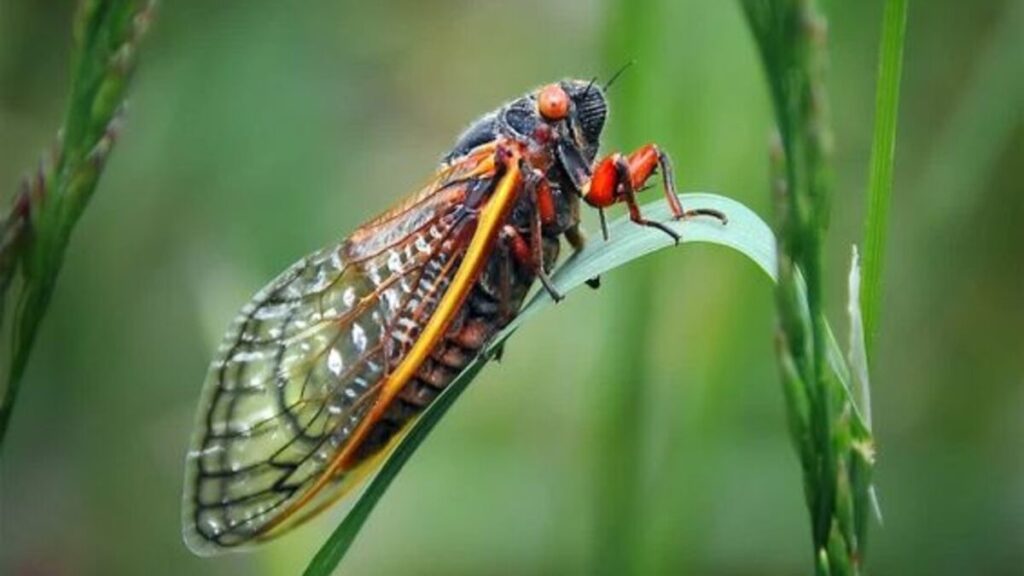
For the first time in two hundred and twenty-one years, two broods of cicadas will emerge in the US. This is a significant event as cicadas are not your everyday insects. According to experts, the two broods of the red-eyes flying insects will emerge from the grounds in April.
They also estimate them to be about a trillion in number. This has not happened since 1803! Therefore, residents of the Midwest and Southeast need to brace themselves for the buzzing insects this spring.
Cicada of different broods usually emerge together but within a specific time frame. However, this will be the first time since 1803 that Brood XIX and Brood XII will appear together. This is because Brood XIX arrives every 13 years while the latter arrives every 17 years.
Therefore, there is usually a time gap between the two. However, 2024 will mark a significant crossover period where both broods will emerge together! This will not happen again until another 221 years pass.
ALSO READ: Researchers Say 29-Million-Year-Old Fossilized Nest Discovered in Oregon Could Be One-of-a-Kind
“What exactly are cicadas?” one may ask. They’re insects that are in the same family as stink bugs and bed bugs. However, unlike bed bugs, they have long translucent wings.
They are hard to miss when they emerge as their males make a loud, shrill, droning noise by vibrating two membranes in their abdomen. This sound is often mistaken for crickets by some people.
They also have big, bright red eyes. Many people do not know this, but they have three extra eyes on top of their heads. Apart from their loud buzzing noises, cicadas do not pose any threats to humans.
POLL — Is Artificial Intelligence a Net Positive or Negative for Mankind?
They do not sting or bite and are benign to humans. This is a huge advantage for humans as pesticides do not work on cicadas. They are also generally not harmful to plants as they do not attack fruit or seeds.
Instead, they feed on the sap of tree trunks. They are quite unique as they emerge from the ground every 13-17 years, depending on the breed. Some weeks before they are set to appear, they create tunnels to the surface. However, they do not come out of their homes until soil temperatures at a depth of 7-8 inches are about 64 degrees Fahrenheit.
There are seven different species of cicadas, three of which surface every 17 years, while the remaining broods emerge every 13 years. On most occasions, cicadas are timely, emerging at the right time. However, sometimes, they are a year early or a year late.
ALSO READ: Florida Officials Charge Woman for Fatally Poisoning Neighbor’s Pets With Insecticide
On a very rare occasion, a particular brood was about four years early in its emergence. In 2024, most states will see the cicadas, but only Illinois and Indiana will be able to see both at once.
States that will see Brood XIII include Iowa, Wisconsin, and possibly Michigan. Most stars will see Brood XIX, including Alabama, Arkansas, Georgia, Kentucky, Louisiana, Missouri, Mississippi, North Carolina, Oklahoma, South Carolina, Tennessee, and Virginia. The cicadas can be annoying, but they are generally harmless, making them less of a concern to many.
You Might Also Like:
Guinness World Records Reviews World Oldest Dog Title Holder, Bobi, Amid Vets’ Skepticism
Judge Strikes Down Requests to Dismiss Case Against Veteran Charged in Subway Chokehold Death
Wall Street Billionaires to Host Fundraiser For Nikki Haley’s Presidential Campaign Amid Controversy
Prosecutors Reveal Hunter Biden’s Gun Pouch Had Cocaine Residue in Court Filing
Texas Senator Condemns Plan to Give Poor Residents $500, Says It’s Unconstitutional
